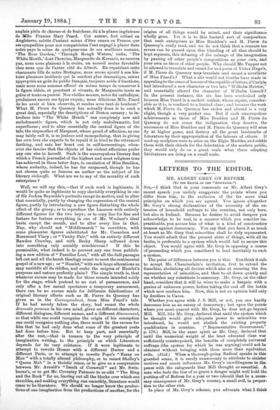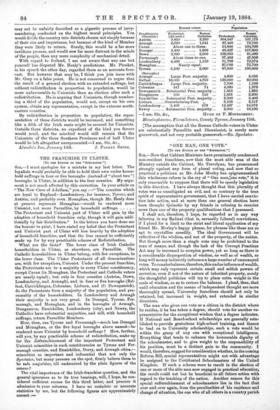LETTERS TO THE EDITOR.
MR. ALBERT GREY ON REFORM.
(To TIM EDITOZ OF TH " SPECTATOR.")
Sna,—I think that in your comments on Mr. Albert Grey's recent speech you unduly exaggerate the points where you differ from him, to the exclusion of the far more vital principles on which you are agreed. You ignore altogether Mr. Grey's strong declarations of the necessity of the ex. tension of household suffrage to the counties, not only here, but also in Ireland. Because he desires to avoid dangers you acknowledge to be real, in a manner which you consider im- practicable, you accuse him of what is a kind of constructive treason against democracy. You say that you have it as much at heart as Mr. Grey that minorities shall be duly represented. You would admit that the present state of things, with all its faults, is preferable to a system which would fail to secure this object. You would agree with Mr. Grey in opposing a course of proceeding which you considered to lead inevitably to such a system.
The point of difference between you is this. You think it safe to accept Mr. Chamberlain's invitation, first to extend the franchise, abolishing all devices which aim at securing the due representation of minorities, and then to sit down quietly and see whether any substitute is necessary. Mr. Grey, on the other hand, considers that it will be wiser to make a bargain with a, genius of unknown power, before taking the seal off the bottle which now confines him. Now, this is not an opinion held only by dwellers in Caves.
Whether you agree with J. S. Mill, or not, you can hardly denounce him as an enemy of democracy; but upon the points where you most quarrel with Mr. Grey, he does not go beyond MilL Mill, like Mr. Grey, declared that until the system which he thought would give adequate power to minorities was introduced, he would not abolish the existing property
qualification in counties. (" Representative Government," p. 178.) Mill, in the same spirit as Mr. Grey, declared that until the numerical weight of the least educated class was sufficiently counterpoised, the benefits of completely universal suffrage (the system for which he was arguing) could not be obtained without bringing with them more than equivalent evils. (Ibid.) When a thorough-going Radical speaks in this guarded sense, it is surely unnecessary to attribute to sinister motives and secret influences Mr. Grey's unwillingness to dis- pense with the safeguards that Mill thought so essential. A man who feels the fear of so grave a danger might well hold the putting-off of Reform for a year or two (should that be a neces- sary consequence of Mr. Grey's course), a small evil, in propor- tion to the other risk.
In place of Mr. Grey's scheme, you advocate what I think may not be unfairly described as a gigantic process of jerry- mandering, conducted on the highest moral principles. You would divide the country into districts chosen not simply because of their size and importance, but because of the kind of Member they were likely to return. Surely, this would be a far more invidious process, and would sow far more distrust in the minds of the people, than any mere complexity of mechanical detail.
With regard to Ireland, I am not aware that any one but yourself has disputed Mr. Healy's predictions. Mr. Plunket, in his speech the other day, regarded them as an accurate fore- cast. But however that may be, I think you join issue with Mr. Grey on a false point. He is not concerned to argue that the result of a general election with an extended suffrage, but without redistribution in proportion to population, would be more unfavourable to Unionists than an election after such a redistribution. He is arguing that Unionists, though number- ing a third of the population, would not, except on his own system, obtain any representation, except in the extreme north- eastern counties.
By redistribution in proportion to population, the repre- sentation of these districts would be increased, and something like a fifth of the Irish seats might be secured for Unionists. Outside these districts, no expedient of the kind you favour would avail, and the mischief would still remain that the Unionists of the three Southern Provinces and of half Ulster would be left altogether unrepresented.-I am, Sir, &c.,



































 Previous page
Previous page